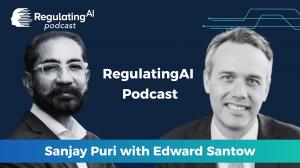From Principles to Practice: Prof. Edward Santow Pushes for Real AI Governance
In conversation with Sanjay Puri, Prof. Edward Santow calls for distributed accountability in AI oversight.
An algorithm searches a data set to make a decision, but the data set itself can represent a history of injustice.”
WASHINGTON, DC, UNITED STATES, September 26, 2025 /EINPresswire.com/ -- In an insightful discussion organized by Sanjay Puri, former Australian Human Rights Commissioner, Prof. Edward Santow delved into how artificial intelligence (AI) is transforming policing, governance, and human rights. The discussion brought out the potential of AI as well as its danger to exacerbate inequality if not addressed. — Prof. Edward Santow
Santow began the discussion with a warning regarding the dangers of predictive policing tools, which use extensive past data to predict criminality. He also pointed out that although these tools are presented as neutral, they tend to perpetuate long-established injustices. "An algorithm searches a data set to make a decision, but the data set itself can represent a history of injustice," Santow said. This, he warned, is a result of the fact that even without racial considerations being made explicitly, proxy variables within the data set can replicate discriminatory results, affecting marginalized communities disproportionately.
Another central issue debated was the transparency of AI decision-making. As opposed to typical legal or administrative decisions, which are subject to review and appeal, algorithmic decisions tend to be closed to the affected persons. "It's more difficult to identify the grounds for that decision … you can't necessarily ascertain whether or not the decision is right because the decision-making process is so cryptic," Santow added. He underlined that in the absence of increased transparency and accountability, public confidence in AI systems will weaken.
Despite the threats, Santow was as unequivocal about the promise of AI for good. He emphasized that technologies, if properly applied, could make inclusion and accessibility advance. "We really want to supercharge the positive uses of AI … AI that can really make our world better and more inclusive while being clear-eyed about what the risks and threats are," he said. He referred to the use of AI to aid persons with disabilities as a case of how technology can be utilised to enrich lives.
Santow also stressed the need for hands-on governance guidelines, beyond general ethical pronouncements to real tools that regulators and businesses will utilise. "Industry needed practical advice, not more flaky principles," he said. He proposed establishing risk-classification systems, which categorize technologies into three levels of risk, that is, high, medium, and low risk, along with oversight systems that ensure accountability. Accountability, he argued, should not rest with a few "AI gurus" but be distributed among governments, businesses, and civil society.
Sanjay Puri bridged the conversation to action, making the point of intersectionality of technology, democracy, and human rights. Reflecting on the conversation, Puri asserted: "Edward's words put us in remembrance that AI is not just algorithms and information. It is justice, it is fairness, and it is protecting the dignity of every human being. If innovation must be for humankind, it must be grounded in principles that prioritise human beings first."
The debate is a timely reminder that as AI advances throughout the world, societies have a choice: allow technology to establish injustice, or construct systems of governance that raise qualities like fairness, dignity, and inclusion.
About RegulatingAI
RegulatingAI, an initiative of Knowledge Networks, is a non-profit organization focused on promoting ethical AI governance. We empower regulators, industry leaders, and advocacy groups with the knowledge and tools necessary to shape the future of AI technologies, ensuring they are developed with trust and transparency.
Ananya Dutta
Knowledge Networks
email us here
Visit us on social media:
LinkedIn
Instagram
Facebook
YouTube
X
Other
Edward Santow on Predictive Policing, Racial Bias and AI’s Impact on Human Rights | RegulatingAI
Legal Disclaimer:
EIN Presswire provides this news content "as is" without warranty of any kind. We do not accept any responsibility or liability for the accuracy, content, images, videos, licenses, completeness, legality, or reliability of the information contained in this article. If you have any complaints or copyright issues related to this article, kindly contact the author above.


